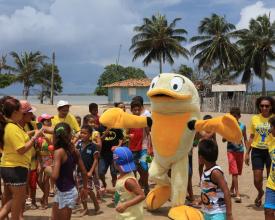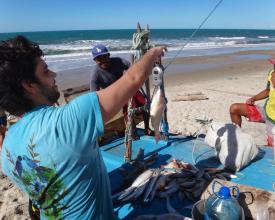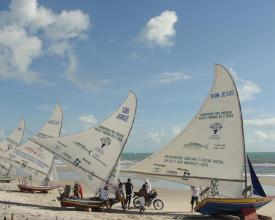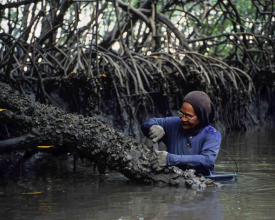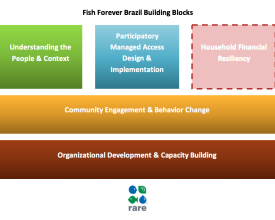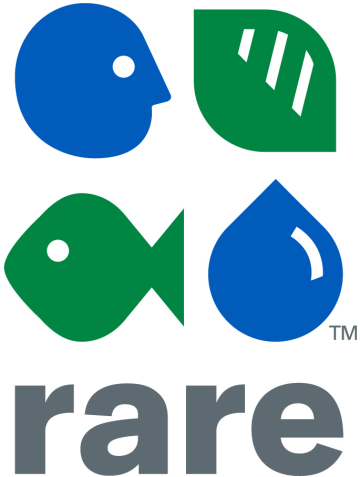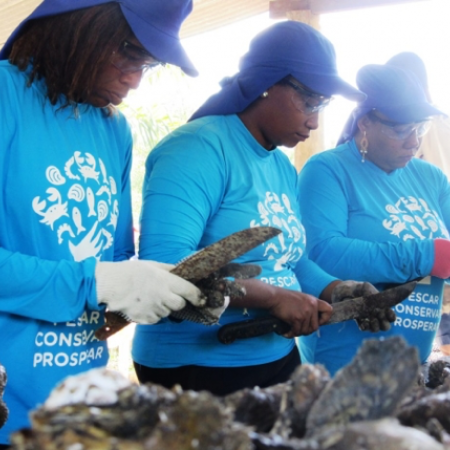
Fish Forever au Brésil : Une solution pour la gestion communautaire de la pêche
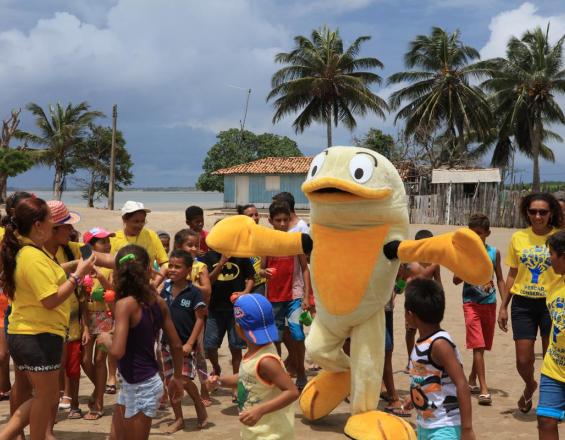
Alors que le développement côtier s'intensifie au Brésil, les pêcheurs artisanaux luttent pour protéger leurs ressources. En s'appuyant sur la structure juridique des réserves d'extraction créées par le gouvernement (RESEX) et en travaillant avec le gouvernement, les organisations locales de pêcheurs et les communautés, le programme Fish Forever de Rare au Brésil a permis 1) d'établir une gouvernance et une autorité communautaires sur la pêche artisanale ; 2) de désigner des zones de pêche à accès contrôlé, associées à des réserves d'interdiction de pêche ; et 3) d'améliorer la participation des pêcheurs et des membres de la communauté à la gestion de la pêche et à la prise de décision.
Contexte
Défis à relever
La première mise en œuvre de Fish Forever au Brésil a dû surmonter des perturbations politiques qui ont profondément affecté la gestion de la pêche à toutes les échelles. Les pêcheurs se sentent de plus en plus insécurisés, frustrés et méfiants à l'égard des systèmes gouvernementaux tels que RESEX. Les communautés sont conscientes de la surexploitation des stocks de poissons et de la diminution de la taille et de la qualité des poissons, mais elles se méfient des nouvelles campagnes, compte tenu de l'inefficacité des projets qu'elles ont connus par le passé. En outre, les changements de direction et d'organisation sont fréquents dans la gestion de RESEX au sein du gouvernement brésilien, ce qui entraîne de fréquents redémarrages du processus de gestion de projet. Enfin, le terme "zone de non-prélèvement" a une connotation négative pour de nombreux pêcheurs artisanaux, c'est pourquoi il a été remplacé par "zone de conservation et de reproduction des espèces cibles" (ACRES), qui englobe également la restauration des stocks de poissons par le biais d'un mouvement national en faveur de pratiques de pêche durables, facilitant le partage d'informations et la sensibilisation des pêcheurs.
Emplacement
Traiter
Résumé du processus
Le processus passe par plusieurs étapes, notamment "Comprendre la population et le contexte", "Processus de conception participative et mise en œuvre", "Engagement communautaire et changement de comportement", et "Développement organisationnel et renforcement des capacités". Dans d'autres régions, comme les Philippines, Fish Forever a également intégré des programmes visant à renforcer la résilience financière au niveau des ménages, un aspect qui pourrait être inclus dans la conception brésilienne à un stade ultérieur. Tous les éléments constitutifs sont étayés tout au long de la mise en œuvre du projet par les éléments constitutifs que sont "l'engagement communautaire et le changement de comportement" et "le développement organisationnel et le renforcement des capacités". Ces deux éléments essentiels doivent accompagner toutes les étapes du processus afin de les rendre efficaces et durables.
Voir le graphique
Blocs de construction
Comprendre les personnes et le contexte
Des recherches qualitatives et quantitatives sont menées pour établir des profils des pêcheries et des pêcheurs. La décision finale concernant les sites de mise en œuvre et les partenaires institutionnels pour la première cohorte du Brésil a été prise sur la base des éléments suivants :
1) l'adéquation du site (dynamique écologique, halieutique et sociale appropriée) ;
2) le potentiel de renforcement de la mise en œuvre des TURF (= droits d'utilisation territoriale pour la pêche) et la création et la mise en œuvre de zones de non-prélèvement ;
3) l'expérience régionale et les leçons apprises
4) les possibilités de financement ;
5) les priorités du gouvernement (ICMBio) et des partenaires en tant qu'opportunité de mise à l'échelle ; et,
6) l'analyse des menaces potentielles au développement d'une réserve TURF (comme les barrages en amont, la pollution, etc.).
Ce processus est également essentiel pour développer des partenariats avec les associations locales et les dirigeants afin d'approuver la mise en œuvre des campagnes dans tous les sites.
Facteurs favorables
Le cadre RESEX (=réserves côtières et marines extractives) du Brésil offre un cadre favorable à la mise en œuvre des réserves TURF. Bien qu'il y ait des différences de gouvernance entre l'approche des communautés locales et celle du gouvernement national (ICMBio), nous pensons qu'il y a une grande opportunité de collaboration pour améliorer la gestion des AMP au Brésil. Un travail politique et un plaidoyer supplémentaires sont absolument nécessaires dans le cadre de la stratégie nationale du Brésil afin de garantir les droits d'accès à la pêche.
Leçon apprise
- Les sites de Fish Forever sont soigneusement sélectionnés en fonction de leur impact potentiel. Nous avons appris, lors de la sélection des sites, que chaque site présente un ensemble de conditions propices à la réussite. Nous avons intégré cette leçon dans le processus de sélection des cohortes. En outre, certains sites moins qu'idéaux nous permettront d'apprendre à travailler sur un plus grand nombre de sites.
- La possibilité de gérer et de "posséder" leurs pêcheries est un avantage considérable pour les pêcheurs, mais les bénéfices biophysiques et économiques devront également être estimés afin de motiver d'autres communautés.
- En rapport avec le thème et les objectifs de la cohorte, une stratégie Pride+ serait appliquée comme stratégie d'intervention pour le changement de comportement. Pride répondra au besoin élargi au-delà d'une approche de marketing social, en incluant également d'autres techniques, telles que la mobilisation communautaire, la stratégie de dynamique de groupe, dès le début afin de créer un environnement favorable pour les TURF.
Conception et mise en œuvre d'un accès géré participatif
À l'aide des données issues du profilage, les pêcheurs et les chefs de communautés sont impliqués dans une série d'ateliers qui les guident dans a) la définition des objectifs de leur communauté en matière de pêche et de conservation, b) l'évaluation de leurs réserves, c) la délimitation des zones d'accès géré, et d) l'accord sur les règles au sein de leurs zones d'accès géré. Une fois ces règles convenues, elles sont codifiées dans une politique, et des dispositions institutionnelles sont mises en place pour leur mise en œuvre.
Grâce à des campagnes de changement de comportement, Fish Forever augmente la productivité des organes de gestion. Ces organismes planifient et approuvent alors de nouvelles lois et de nouveaux rôles pour la pêche qui auront un impact positif sur la communauté.
Facteurs favorables
L'adhésion du gouvernement brésilien par l'intermédiaire des organes de gestion du RESEX et d'une structure juridique préexistante pour la gestion de l'accès des pêcheurs a ouvert la voie à la campagne et à la mise en œuvre de la gestion de l'accès et de la réserve.
Leçon apprise
Il est important que toutes les discussions et tous les accords conclus au cours des ateliers soient partagés avec les communautés et que des sessions de consultation soient organisées avant de passer à l'étape suivante du processus de conception.
Engagement communautaire et changement de comportement
L'équipe chargée de la campagne de changement de comportement dans chaque municipalité utilise un mélange de matériel créatif et d'activités de mobilisation communautaire pour inspirer et éduquer les pêcheurs et leurs familles sur les avantages de travailler ensemble pour mieux gérer leurs pêcheries. Dans la phase de "préparation", les messages sont axés sur l'enregistrement des pêcheurs, le respect des lois de base sur la pêche et la participation aux réunions. Dans la deuxième phase, après l'institutionnalisation des zones d'accès gérées, les messages se concentrent sur le respect des règles et le suivi de leurs prises. Dans la seconde phase, après l'institutionnalisation des zones d'accès contrôlées, les messages se concentrent sur le respect des règles et le contrôle des prises. Grâce au marketing social, Fish Forever peut plus facilement obtenir l'adhésion des communautés au respect des meilleures pratiques de pêche et encourager les communautés à trouver de nouvelles solutions pour une gestion durable de la pêche.
Facteurs favorables
Un fort sentiment d'appartenance et d'identité parmi les pêcheurs des communautés et le soutien actif des dirigeants municipaux et villageois, associés à un personnel motivé et efficace de Fish Forever et Rare, ont permis aux sites brésiliens de reproduire leur succès dans d'autres régions.
Leçon apprise
Il existe de nombreux points communs entre les sites, de sorte que les campagnes ont pu utiliser et adapter le matériel d'autres municipalités qui se concentrent également sur la gestion de la pêche. L'adaptation locale, en particulier des activités de mobilisation, a contribué à rendre les campagnes plus spécifiques au site et à les rendre plus "appropriables" par la communauté.
Développement organisationnel et renforcement des capacités
Plusieurs organisations essentielles au sein des communautés doivent être développées ou renforcées afin d'assurer le succès à long terme de la gestion des pêches. Les campagnes doivent veiller à ce que les conseils de pêche, les organes de gestion et les associations de pêcheurs soient organisés et fonctionnent bien. Ils sont formés sur des sujets tels que la gestion adaptative de la pêche, les éléments essentiels de la gestion, la gestion des bénévoles et le renforcement de l'esprit d'équipe.
Facteurs favorables
Pour mettre en œuvre un système de gestion partagée, chaque RESEX dispose de son propre conseil délibératif, un organe de gestion composé de membres élus par la communauté, qui représentent cette dernière et votent en son nom. Rare travaille directement avec ce groupe pour améliorer le processus de prise de décision au niveau de la communauté. Les partenaires locaux de mise en œuvre de Rare sont de petites associations ayant des liens étroits avec la communauté. Ils sont en mesure de gérer efficacement les fonds et de participer directement à la conception des projets de campagne.
Leçon apprise
L'implication de l'organe de gestion dans la définition des objectifs de la campagne a été une étape clé pour les campagnes de Fish Forever. Lorsque ces groupes ont compris et soutenu les stratégies de Rare, ils ont été plus enclins à soutenir la mise en œuvre de zones d'interdiction de pêche et d'autres pratiques de gestion durable de la pêche, telles que l'ACRES. Les campagnes et les formations de renforcement des capacités ont également permis à ces groupes de partager leurs connaissances et leurs expériences positives avec d'autres AMP et organismes de gestion au Brésil, par l'intermédiaire des organisations nationales de pêche, qui ont également soutenu la reproduction et l'élargissement de la prochaine cohorte de Fish Forever.
Impacts
Fish Forever Brazil a impliqué 11 communautés et 9 800 membres de ces communautés, qui se sont engagés dans une gestion durable de la pêche menée par les communautés.
Ce projet couvre 357 096 000 ha de zones RESEX réparties sur différents sites. 14 réserves interdites à la pêche ont été créées, ajoutant 1 383 ha protégés par la communauté locale (tableau 1).
Les campagnes de changement de comportement ont permis de promouvoir un comportement de pêche durable au niveau des sites (tableau 2) et d'améliorer les connaissances, la communication interpersonnelle et le changement de comportement en faveur de pratiques de pêche durables, également au niveau national. Les campagnes encouragent les communautés à participer directement à la gestion et à la planification de la pêche, à contribuer au suivi scientifique et à créer de nouvelles réglementations au niveau local (tableau 3).
Neuf espèces cibles importantes sur le plan environnemental, social et économique sont désormais gérées de manière durable par les communautés, selon les meilleures pratiques de capture et de gestion. Pour la première fois, 620 pêcheurs (32 % des pêcheurs ciblés) sont organisés et utilisent des carnets de bord pour enregistrer leurs prises, ce qui leur permet de faire le lien entre leurs prises et leurs dépenses quotidiennes. Les carnets de bord ont été mis en place pour se conformer aux exigences de RESEX en matière de déclaration des données de pêche et sont acceptés par de nombreuses institutions économiques comme preuve de revenu.
L'approche communautaire du développement de la gouvernance, de la planification et de la capacité de prise de décision permet de renforcer la capacité d'adaptation au changement climatique.
Bénéficiaires
- Pêcheurs
- Associations de pêcheurs
- Agence environnementale brésilienne (ICMBio)
- Gouvernements locaux
- Groupes de femmes
- Chercheurs
Objectifs de développement durable
Histoire

Dans le RESEX marin brésilien de Baia do Iguape, dans l'État de Bahia, des femmes de la communauté travaillent dans les mangroves, où elles cultivent et récoltent des coquillages, notamment des huîtres,
Les femmes, dont la plupart sont à la tête de familles monoparentales, se rendent chaque jour dans les mangroves pour effectuer ce travail éreintant.
Les huîtres sont une espèce écologiquement importante. Elles réduisent la pression sur l'environnement naturel et constituent une espèce indicatrice de l'efficacité des initiatives de protection de l'environnement. Elles ont également une importance économique car, en tant qu'espèce à croissance rapide, elles offrent un plus grand potentiel commercial aux pêcheurs. Cependant, les pratiques non durables menacent l'habitat naturel des huîtres et les moyens de subsistance des personnes qui les récoltent.
En mars 2016, Rare a lancé une campagne de fierté, menée par Daniel Andrade. C'est un leader de la communauté, car ses grands-parents étaient pêcheurs et utilisaient la zone de RESEX dans le passé pour la pêche. Daniel a grandi en allant dans la mangrove avec sa famille, mais il a poursuivi ses études à l'université et a obtenu un diplôme en commerce. Il investit maintenant ses connaissances et son éducation en tant qu'adulte pour obtenir le soutien de la communauté en faveur de la gestion durable des huîtres. 30 femmes qui récoltent des huîtres et d'autres coquillages ont participé au lancement de sa campagne de fierté, vêtues de t-shirts de la campagne.Au cours de la cérémonie, l'un des dirigeants locaux a livré un témoignage émouvant sur le fait que, par le passé, ces femmes avaient honte de ce qu'elles étaient - pauvres, toujours sales à cause de la boue de la mangrove. Ce projet a contribué à renforcer leur estime de soi et à leur inculquer un sentiment de fierté pour leur travail et leur identité. Aujourd'hui, elles portent la boue comme un insigne d'honneur.
La campagne a permis de promouvoir des pratiques de culture durables et d'installer des fermes ostréicoles familiales afin de réduire la pression exercée par la pêche sur les populations d'huîtres dans les mangroves.Daniel a également réussi à obtenir des fonds du gouvernement de l'État pour l'achat d'équipements et la construction d'un nouveau siège social. Lui et les femmes dirigeantes ont rencontré les communautés voisines pour savoir comment se connecter aux chaînes d'approvisionnement afin d'amener les huîtres sur le marché.
D'un point de vue social, la campagne a eu un impact sur l'autonomisation des femmes et la fierté de la communauté. En améliorant les compétences professionnelles et les conditions de culture des huîtres et en facilitant l'accès aux marchés, la campagne renforcera les moyens de subsistance de ces femmes et de leurs familles.
